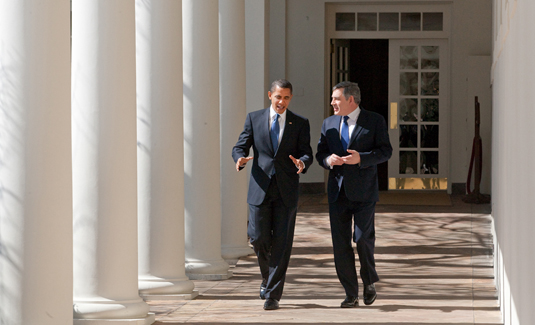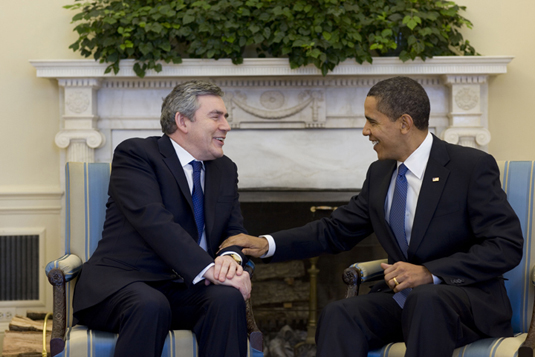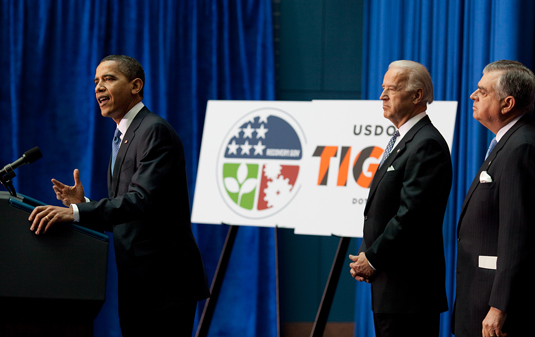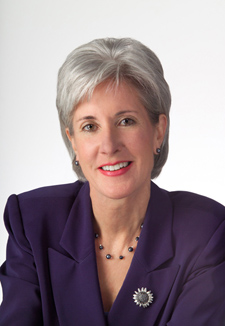-
 President Barack Obama and Prime Minister Gordon Brown walk along the colonnade between the residence and the West Wing of the White House. (White House photo 3/3/09 by Joyce N. Boghosian)
President Barack Obama and Prime Minister Gordon Brown walk along the colonnade between the residence and the West Wing of the White House. (White House photo 3/3/09 by Joyce N. Boghosian)"Where are the Brits? They're over there," President Obama said, playfully, during a press Q&A following a meeting with British Prime Minister Gordon Brown.
"In fact, they're everywhere," Prime Minister Brown replied.
And in that spirit of Anglo-American equity, the President and Prime Minister took questions from reporters from both sides of the pond.
"I think that there are a set of shared values and shared assumptions between us," President Obama said said during a meeting with British Prime Minister Gordon Brown. "That we believe in the free market, we believe in a government that is not overbearing and allows entrepreneurs and businesses to thrive, but we also share a common belief that there have to be sufficient regulatory structures in place so that the market doesn't spin out of control."
Answers to other questions, including clarification of rumors about a letter to the Russian President and reaction to the tragic shooting in Pakistan, are in the full transcript.
 President Barack Obama and Prime Minister Gordon Brown meeting in the Oval Office of the White House. (White House photo 3/3/09 by Pete Souza)
President Barack Obama and Prime Minister Gordon Brown meeting in the Oval Office of the White House. (White House photo 3/3/09 by Pete Souza) -
 President Barack Obama addresses a crowd gathered at the Department of Transportation in Washington, D.C., to discuss infrastructure spending as part of the American Recovery and Investment Act, as Vice President Joe Biden and Transportation Secretary Ray LaHood listen.(White House photo 3/3/09 by Pete Souza)
President Barack Obama addresses a crowd gathered at the Department of Transportation in Washington, D.C., to discuss infrastructure spending as part of the American Recovery and Investment Act, as Vice President Joe Biden and Transportation Secretary Ray LaHood listen.(White House photo 3/3/09 by Pete Souza)
"Thanks in large part to Joe Biden....and because of all the governors and mayors, county and city officials who are helping implement this plan, I can say that 14 days after I signed our Recovery Act into law, we are seeing shovels hit the ground," President Obama said in remarks at the Department of Transportation today, announcing the apportionment of $26.6 billion of a total $28 billion in infrastructure spending.
"Two weeks ago, I signed into law the American Recovery and Reinvestment Act, the most sweeping economic recovery plan in history," he said. "And already, its impact is being felt across this nation. Hardworking families can now worry a little less about next month's bills because of the tax cut they'll soon find in the mail. Renewable energy companies that were once downsizing are now finding ways to expand. And transportation projects that were once on hold are now starting up again -- as part of the largest new investment in America's infrastructure since President Eisenhower built the Interstate Highway System."
Just prior to the President's remarks, Secretary LaHood announced the first project will be in Montgomery County, Md., on State Route 650. Learn more about how the funds are going to be spent, including state-by-state and urban-suburban-rural breakdowns, at Recovery.gov.
-
Yesterday Secretary of State Hillary Clinton spoke at a donor’s conference for Gaza recovery hosted by Egypt as part of her first trip as Secretary to the Middle East. This early trip, as well as the appointment of George Mitchell as Special Envoy, indicate a deep commitment from the Obama Administration to engagement in finding a long-term peace. But her speech went beyond simply showing up and shaking hands, as she explained clearly to all at the conference and around the world that to achieve the goal of a peaceful, responsible Palestinian state, all parties have an important role to play and change to make:For the Israelis, that means showing the Palestinians that there are benefits to negotiating if their goal is to control their own destiny and live in peace and dignity in an economically viable state.For the Arab states, it means signaling through words and deeds that the spirit of the Arab Peace Initiative can begin to govern attitudes toward Israel now. For all of us – the Arab states and the wider international community – it means working with the government of the Palestinian people, the Palestinian Authority, to help build a state that can meet international expectations and obligations.And for the Palestinians, it means that it is time to break the cycle of rejection and resistance, to cut the strings pulled by those who exploit the suffering of innocent people, and show the world what the talent and skills of an exceptional people can build and create.Watch the video here. The State Department has also launched an interactive map to log and detail the Secretary’s travel, which one can imagine quickly becoming an amazing historical document of sorts. While you’re over there, also check out the new "Text the Secretary" feature.
-
 Overhauling our health care system is going to take the will to fight entrenched special interests and lobbyists, the patience to work across party lines, and a little Kansas common sense.
"Kathleen Sebelius has a remarkable intellect, unquestioned integrity, and the kind of pragmatic wisdom you’ll tend to find in a Kansan," President Obama said as he announced the Kansas Governor as his choice to lead the Department of Health and Human Services. "I know she will bring some much-needed grace and good humor to Washington, and she will be a tremendous asset to my cabinet."The governor of Kansas since 2003, Secretary-designate Sebelius has a reputation for reaching across the aisle to work with Democrats and Republicans alike, while standing firm for what she believes in the face of pressure from special interests. And before being elected governor, she served as Kansas Insurance Commissioner from 1994-2002 -- so she knows her stuff.That's also true of Nancy Ann DeParle, the President's choice to lead the White House Office of Health Reform and one of the nation's top health care experts. She learned firsthand how our broken health care system can impact workers and families as Tennessee's commissioner of the Department of Human Services. And she saw the big picture in the Clinton administration, where she handled health care budget issues and managed Medicare and Medicaid.Along with these announcements, President Obama also said today that $155M from the Recovery Act will go toward supporting 126 new health centers across the country, providing care to 750,000 Americans and creating 5,000 jobs. (Get a state-by-state breakdown of how many patients will benefit from the Recovery Act funding for community health care centers.)It’s just an early step in a major undertaking to lower costs and expand care that isn’t just the right thing to do – it’s absolutely necessary."If we are going to help families, save businesses, and improve the long-term economic health of our nation, we must realize that fixing what’s wrong with our health care system is no longer just a moral imperative, but a fiscal imperative," the President said today. "Health care reform that reduces costs while expanding coverage is no longer just a dream we hope to achieve – it’s a necessity we have to achieve."
Overhauling our health care system is going to take the will to fight entrenched special interests and lobbyists, the patience to work across party lines, and a little Kansas common sense.
"Kathleen Sebelius has a remarkable intellect, unquestioned integrity, and the kind of pragmatic wisdom you’ll tend to find in a Kansan," President Obama said as he announced the Kansas Governor as his choice to lead the Department of Health and Human Services. "I know she will bring some much-needed grace and good humor to Washington, and she will be a tremendous asset to my cabinet."The governor of Kansas since 2003, Secretary-designate Sebelius has a reputation for reaching across the aisle to work with Democrats and Republicans alike, while standing firm for what she believes in the face of pressure from special interests. And before being elected governor, she served as Kansas Insurance Commissioner from 1994-2002 -- so she knows her stuff.That's also true of Nancy Ann DeParle, the President's choice to lead the White House Office of Health Reform and one of the nation's top health care experts. She learned firsthand how our broken health care system can impact workers and families as Tennessee's commissioner of the Department of Human Services. And she saw the big picture in the Clinton administration, where she handled health care budget issues and managed Medicare and Medicaid.Along with these announcements, President Obama also said today that $155M from the Recovery Act will go toward supporting 126 new health centers across the country, providing care to 750,000 Americans and creating 5,000 jobs. (Get a state-by-state breakdown of how many patients will benefit from the Recovery Act funding for community health care centers.)It’s just an early step in a major undertaking to lower costs and expand care that isn’t just the right thing to do – it’s absolutely necessary."If we are going to help families, save businesses, and improve the long-term economic health of our nation, we must realize that fixing what’s wrong with our health care system is no longer just a moral imperative, but a fiscal imperative," the President said today. "Health care reform that reduces costs while expanding coverage is no longer just a dream we hope to achieve – it’s a necessity we have to achieve." -
John Brennan, Assistant to the President for Homeland Security and Counterterrorism, passed along this update about the ongoing review of our nation's communications and information infrastructure.In response to President Obama’s direction, the National Security Council and Homeland Security Council are presently conducting a 60-day review of the plans, programs, and activities underway throughout the government that address our communications and information infrastructure (i.e., cyberspace). The purpose of the review is to develop a strategic framework to ensure that our initiatives in this area are appropriately integrated, resourced and coordinated both within the Executive Branch and with Congress and the private sector.Our nation’s security and economic prosperity depend on the security, stability, and integrity of communications and information infrastructure that are largely privately-owned and globally-operated. Safeguarding these important interests will require balanced decision making that integrates and harmonizes our national and economic security objectives with enduring respect for the rule of law. Guided by this principle, the review will build upon existing policies and structures to formulate a new vision for a national public-private partnership and an action plan to: enhance economic prosperity and facilitate market leadership for the U.S. information and communications industry; deter, prevent, detect, defend against, respond to, and remediate disruptions and damage to U.S. communications and information infrastructure; ensure U.S. capabilities to operate in cyberspace in support of national goals; and safeguard the privacy rights and civil liberties of our citizens.The review will be completed by the end of April 2009. At that time, the review team will present its recommendations to the President regarding an optimal White House organizational construct to address issues related to U.S. and global information and communications infrastructure and capabilities. The recommendations also will include an action plan on identifying and prioritizing further work in this area.
Learn more about the administration's Homeland Security priorities.
- &lsaquo previous
- 1
- 2
- 3
- 4
- 5








